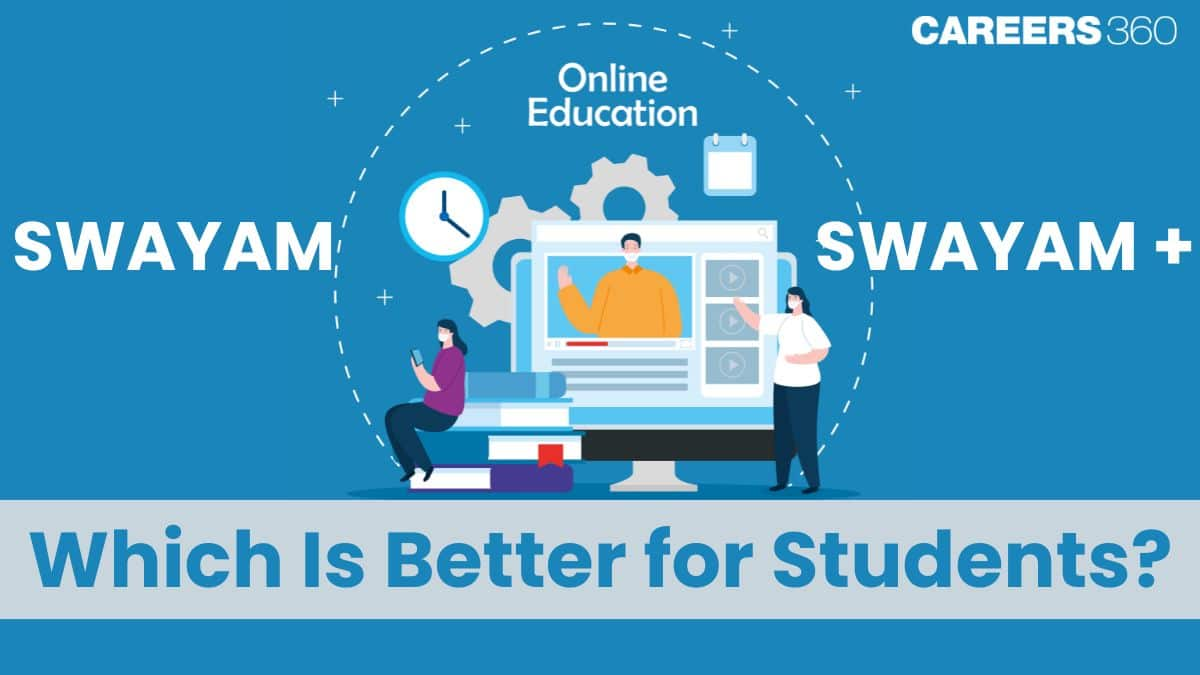SWAYAM vs SWAYAM Plus: Which Is Better for Students?
SWAYAM (Study Webs of Active-Learning for Young Aspiring Minds) is India’s flagship government MOOC platform launched by the Ministry of Education to provide free online courses from school to postgraduate level. With more than 5 crore enrollments in SWAYAM courses, IIT Madras, under the Ministry of Education, has launched the SWAYAM Plus portal in February 2024 to provide employment-oriented, short-duration, skill and industry-aligned courses (including credit transfer pathways) to improve employability and micro-credentialing. Both platforms are government-run but differ in course design, assessment, certification model and industry linkages. For detailed information, read the full article below.
This Story also Contains
- What are SWAYAM and SWAYAM Plus?
- SWAYAM vs SWAYAM Plus: Comparison Table
- SWAYAM vs SWAYAM Plus: How Assessments And Certificates Differ
- Which one should you pick? (student-focused guidance)

What are SWAYAM and SWAYAM Plus?
SWAYAM is the Centre’s comprehensive MOOC portal that hosts classroom-level and higher-education courses prepared by academic institutes and approved by the Department of Higher Education. SWAYAM courses emphasise semester-style, credit-bearing courses as well as self-paced learning.
SWAYAM Plus is an MoE initiative that operates alongside SWAYAM, curating short, industry-relevant, and employment-oriented courses, often in collaboration with technology and industry partners, aimed at skill upgradation and micro-credentials. SWAYAM Plus portal focuses on rapid skill delivery and credit recognition where applicable.
SWAYAM vs SWAYAM Plus: Comparison Table
To understand the comparison between the SWAYAM and SWAYAM Plus, check the table below.
| Feature | SWAYAM | SWAYAM Plus |
|---|---|---|
Managing authority | Ministry of Education / SWAYAM central portal (Dept. of Higher Education). | Initiative under the Ministry of Education coordinated as SWAYAM Plus (separate portal). |
Course types | Semester courses, university-credit courses, self-paced; academic and classroom courses from universities and central institutions. | Short-duration, employment-oriented, skill & micro-credential courses (industry + academia). |
Typical duration | Weeks to full semester (6–12+ weeks up to semester length) | Short workshops to multi-week intensive courses (tens of hours) |
Course providers/partners | Central universities, IITs, IIMs, NPTEL, IGNOU, NCERT, etc. (academic institutions). | Industry partners, training bodies and academic nodes coordinated under SWAYAM Plus (e.g., IITM Pravartak nodes). |
Access cost | Free to learn; exam/certificate requires registration and proctored exam fee. | Mostly free to learn; many courses offer certificates (may require meeting criteria / small fee). |
Certification & exam model | Proctored final exams at designated centres for certificate/credit; universities may accept credits per rules. | Certificates of completion; some courses also allow credit recognition and assessment mechanisms as defined per course. |
Credit transfer/recognition | Designed for credit transfer in many courses, universities may accept SWAYAM credits per the framework. | Built to enable credit recognition and industry credentials; credit recognition varies by course and partner institution. |
Enrollment scale (latest official) | Platform-level enrolments have exceeded 5.1 crore since inception; semester enrolments run into millions per cycle. | Growing catalogue of 400+ job-oriented courses (catalogue shows multiple live offerings); targeted at employability cohorts. |
Best for | Degree students needing credits, in-depth academic learning | Job seekers, working professionals, short upskilling and micro-credentials |
SWAYAM vs SWAYAM Plus: How Assessments And Certificates Differ
SWAYAM: Many courses follow a formal semester schedule and require in-person proctored exams at designated centres to earn official SWAYAM certificates and credits; exam registration and eligibility criteria are posted per course. This makes SWAYAM certificates more suitable for university credit transfer.
SWAYAM Plus: Uses flexible assessment models (online assessments, project submissions, or short proctored tests, depending on the course). It emphasises industry relevance and quicker certificate issuance for employability. Check each course page for the exact assessment method.
Which one should you pick? (student-focused guidance)
If you want university credits or need a course that can plug into your degree (e.g., elective credits), choose SWAYAM. Look for courses listed with credit details and exam schedules.
If you are a working professional, job seeker, or want skill-specific short training (data science modules, short AI courses, soft skills, retail upskilling), SWAYAM Plus is often faster and more directly employability-oriented.
For a hybrid approach, many learners take domain fundamentals on SWAYAM (deep academic grounding) and then take SWAYAM Plus skill modules for hands-on, industry-aligned tools.
SWAYAM is better when you want academically rigorous, credit-transferable semester courses from universities (suitable for degree credit or deep academic study). SWAYAM Plus is designed for short, practical, job-facing training and micro-credentials (suitable for skill-building, re-skilling, and quick upskilling). Both are free to access for learning; certificates and proctored exams typically involve a nominal fee and specified exam processes.
Frequently Asked Questions (FAQs)
The SWAYAM portal publishes enrollment statistics and semester exam schedules; the Ministry of Education (MoE) annual reports also include platform achievements and aggregated numbers.
Many employers value the demonstrable skills and project work from SWAYAM Plus and recognised SWAYAM courses — but employer recognition varies by sector. For academic credit, institutions follow MoE guidance. Always check employer or program-specific requirements.
SWAYAM hosts hundreds to thousands of courses across semesters and self-paced offerings; semester listings and provider pages show current course counts (NPTEL, university nodes etc.). Enrollment stats are updated on the portal.
SWAYAM traditionally uses in-person proctored exams for certificate/credit courses; however formats can vary—check each course announcement. Hybrid/exam modes have been introduced for some semesters.
SWAYAM Plus focuses on short, industry-aligned courses ideal for rapid skill acquisition and employability.
Register for the course’s exam as instructed on the course page, meet eligibility (attendance/assessments), and appear for the proctored exam where applicable. Certificates are issued only after meeting the criteria.
Some SWAYAM Plus courses are designed for credit recognition, but credit acceptance is determined by the receiving university/institute that always confirm with your institution.
Both platforms allow free access to learning materials. Certificates and proctored exams usually require registration and a nominal fee as specified on the course page.
